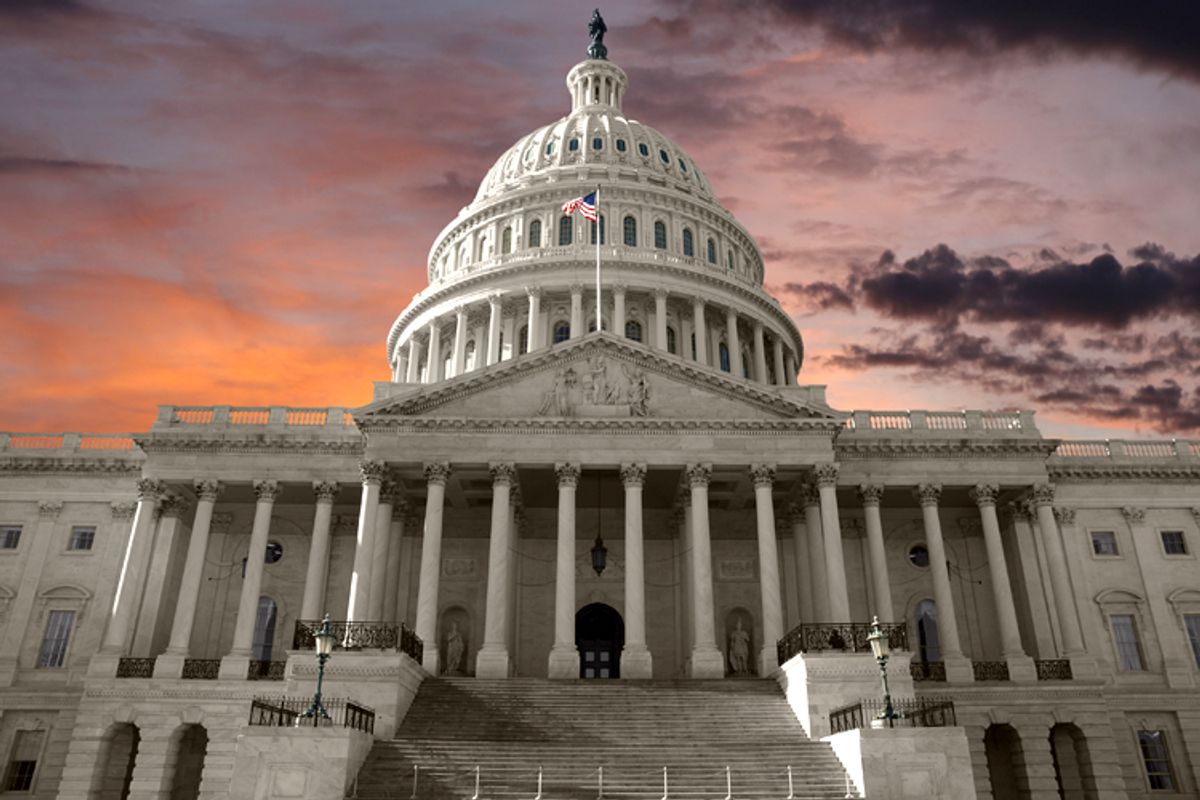The trifecta of political controversies that Washington is currently fixated on have finally made a dent on the polls. Now, after a few weeks of making a big fuss about three completely unrelated Obama scandals, or at least some scandalous things that happened while Obama was president, an equal number of Americans intend to vote for Republicans and for Democrats in this year's midterm elections, according to a new Quinnipiac Poll reported by Politico.
When asked who they wanted to send to the House of Representatives in next year’s midterm elections, the GOP and Democratic candidate tied at 38 percent, according to a Quinnipiac University poll released Thursday. Twenty percent of those surveyed said they didn’t know or didn’t have an answer for who they would vote for. In Quinnipiac’s last two polls, released May 1 and April 3, Democrats had been leading Republicans 41-37 and 43-35, respectively.
The unmentioned fun part is that if an equal number of votes are cast, in November 2014, for Democrats and for Republicans, that means that Republicans will win a massive wave election, easily retaining control of the House of Representatives and possibly retaking the Senate. And if that does happen no one will consider it odd or scandalous or anything.
Last year, more people voted for Democrats for Congress than for Republicans. The result was two more hilarious years of John Boehner and his wacky gang of lovable ne'er-do-wells and malcontents running the House. An evenly split vote next year would mean another two years, probably with a larger majority. Which would mean more gridlock and governance-via-crisis-lurching.
This is thanks in large part to gerrymandering, and the fact that Republicans have gotten quite good and ruthless about district-carving lately, but it's also simply because there's no good way to operate a truly democratically representative House in a two-party country where one party's base congregates in compact urban areas and the other party's base is spread throughout rural and exurban areas. There are better ways than the way we currently do it, obviously. The way we currently do it is weird and archaic and easily gamed.
The Politico story, being rather brief, doesn't mention any of this. As I said, it's not considered particularly scandalous that Republicans retained control of the House in 2012 despite receiving fewer votes, nationally. Americans have been taught to think that "divided government" is the American ideal, because it forces "compromise" and provides "checks" on one party's ambitions. We'd probably actually get compromise and necessary checks if we had a sane opposition party. We don't, so much, though. There are sane Republicans, but not many of them end up in the House of Representatives.
But according to Quinnipiac, 20 percent of Americans still haven't decided which party they'll be voting for next year. This is the part where Obama should begin explaining to the people who voted for him that if those people want him to actually have the power to implement his domestic policy agenda, instead of merely sitting around for the next few years droning dudes or whatever, they should get out and vote for any schmuck with a "D" next to his name on their ballot next year. The president didn't do such a great job of making that case in 2010.
There aren't actually many voters who desire divided government so much that they actually vote for "split tickets." That was sort of a thing in the '70s and '80s, when significant numbers of Democratic voters (conservative, white, Southern ones, mostly) voted for Nixon and Reagan and for Democratic members of Congress, but that, like so many things in the '70s and '80s, was an aberration, and since then split ticket voters have gone back to being quite rare. The problem for Democrats is that Republicans have structural advantages in Congress and their supporters are simply more likely to actually vote in non-presidential election years. There are a ton of Obama voters who don't know, care about or like their local Democratic member of Congress or candidate for Congress. (The party could maybe work on finding better candidates, but running for Congress is expensive and generally the desire to do so is more prevalent in people who are sort of awful.)
These numbers are also another indication that the recent relentless hammering the administration has taken in the press for these three long-overdue scandals is depressing liberals and affecting voters' intentions. The poll also asked people how much they cared about the three delightful scandals we have all decided to care about, and the results were unsurprisingly depressing:
Voters nationwide also are calling for a special prosecutor to be appointed to investigate the Internal Revenue Service controversy. Seventy six percent of voters want a prosecutor to be appointed, and 44 percent say the IRS scandal is the most important of the three currently hitting the Obama administration, followed by Benghazi at 24 percent and the AP records seizure at 15 percent.
Those aren't strictly in inverse order of importance, but they are in inverse order of degree to which you can directly blame Obama's administration. (Sorry, journalists, no one cares about you.)
Obviously it's still mid-2013, and it will take a lot of effort to sustain any one of these stories, let alone all three, through next year, unless some actual criminal activity in the White House is uncovered. It's still quite possible that in 2014, Democrats will again win a majority of congressional votes. And even if they do, they will probably still remain a minority in the House.



Shares